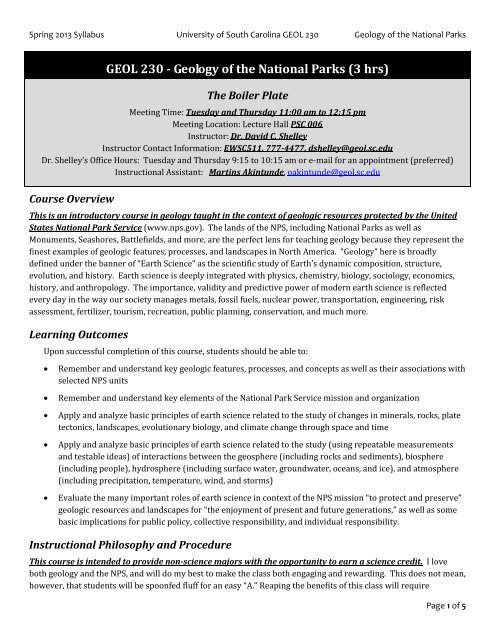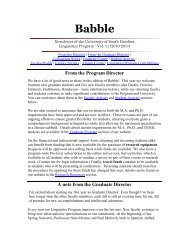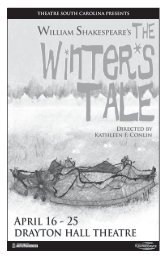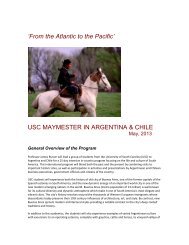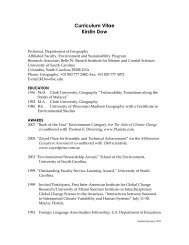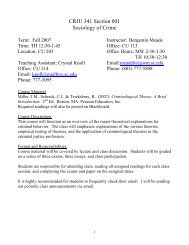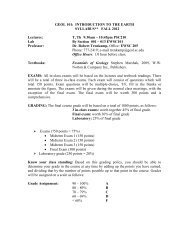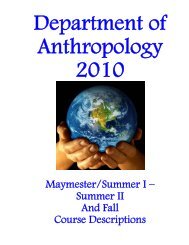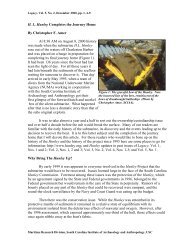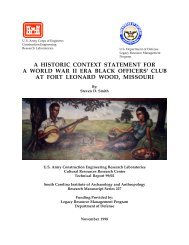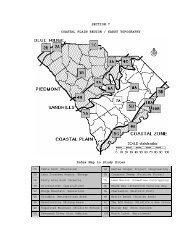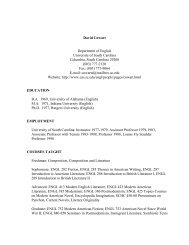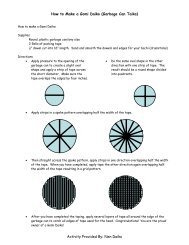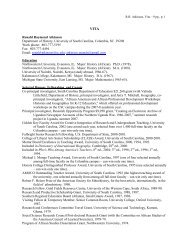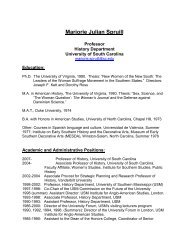GEOL 230 - Geology of the National Parks - College of Arts and ...
GEOL 230 - Geology of the National Parks - College of Arts and ...
GEOL 230 - Geology of the National Parks - College of Arts and ...
You also want an ePaper? Increase the reach of your titles
YUMPU automatically turns print PDFs into web optimized ePapers that Google loves.
Spring 2013 Syllabus University <strong>of</strong> South Carolina <strong>GEOL</strong> <strong>230</strong> <strong>Geology</strong> <strong>of</strong> <strong>the</strong> <strong>National</strong> <strong>Parks</strong><br />
<strong>GEOL</strong> <strong>230</strong> - <strong>Geology</strong> <strong>of</strong> <strong>the</strong> <strong>National</strong> <strong>Parks</strong> (3 hrs)<br />
The Boiler Plate<br />
Meeting Time: Tuesday <strong>and</strong> Thursday 11:00 am to 12:15 pm<br />
Meeting Location: Lecture Hall PSC 006<br />
Instructor: Dr. David C. Shelley<br />
Instructor Contact Information: EWSC511, 777-4477, dshelley@geol.sc.edu<br />
Dr. Shelley’s Office Hours: Tuesday <strong>and</strong> Thursday 9:15 to 10:15 am or e-mail for an appointment (preferred)<br />
Instructional Assistant: Martins Akintunde, oakintunde@geol.sc.edu<br />
Course Overview<br />
This is an introductory course in geology taught in <strong>the</strong> context <strong>of</strong> geologic resources protected by <strong>the</strong> United<br />
States <strong>National</strong> Park Service ( www.nps.gov).<br />
The l<strong>and</strong>s <strong>of</strong> <strong>the</strong> NPS, including <strong>National</strong> <strong>Parks</strong> as well as<br />
Monuments, Seashores, Battlefields, <strong>and</strong> more, are <strong>the</strong> perfect lens for teaching geology because <strong>the</strong>y represent <strong>the</strong><br />
finest examples <strong>of</strong> geologic features, processes, <strong>and</strong> l<strong>and</strong>scapes in North America. “<strong>Geology</strong>” here is broadly<br />
defined under <strong>the</strong> banner <strong>of</strong> “Earth Science” as <strong>the</strong> scientific study <strong>of</strong> Earth’s dynamic composition, structure,<br />
evolution, <strong>and</strong> history. Earth science is deeply integrated with physics, chemistry, biology, sociology, economics,<br />
history, <strong>and</strong> anthropology. The importance, validity <strong>and</strong> predictive power <strong>of</strong> modern earth science is reflected<br />
every day in <strong>the</strong> way our society manages metals, fossil fuels, nuclear power, transportation, engineering, risk<br />
assessment, fertilizer, tourism, recreation, public planning, conservation, <strong>and</strong> much more.<br />
Learning Outcomes<br />
Upon successful completion <strong>of</strong> this course, students should be able to:<br />
• Remember <strong>and</strong> underst<strong>and</strong> key geologic features, processes, <strong>and</strong> concepts as well as <strong>the</strong>ir associations with<br />
selected NPS units<br />
• Remember <strong>and</strong> underst<strong>and</strong> key elements <strong>of</strong> <strong>the</strong> <strong>National</strong> Park Service mission <strong>and</strong> organization<br />
• Apply <strong>and</strong> analyze basic principles <strong>of</strong> earth science related to <strong>the</strong> study <strong>of</strong> changes in minerals, rocks, plate<br />
tectonics, l<strong>and</strong>scapes, evolutionary biology, <strong>and</strong> climate change through space <strong>and</strong> time<br />
• Apply <strong>and</strong> analyze basic principles <strong>of</strong> earth science related to <strong>the</strong> study (using repeatable measurements<br />
<strong>and</strong> testable ideas) <strong>of</strong> interactions between <strong>the</strong> geosphere (including rocks <strong>and</strong> sediments), biosphere<br />
(including people), hydrosphere (including surface water, groundwater, oceans, <strong>and</strong> ice), <strong>and</strong> atmosphere<br />
(including precipitation, temperature, wind, <strong>and</strong> storms)<br />
• Evaluate <strong>the</strong> many important roles <strong>of</strong> earth science in context <strong>of</strong> <strong>the</strong> NPS mission “to protect <strong>and</strong> preserve”<br />
geologic resources <strong>and</strong> l<strong>and</strong>scapes for “<strong>the</strong> enjoyment <strong>of</strong> present <strong>and</strong> future generations,” as well as some<br />
basic implications for public policy, collective responsibility, <strong>and</strong> individual responsibility.<br />
Instructional Philosophy <strong>and</strong> Procedure<br />
This course is intended to provide non-science majors with <strong>the</strong> opportunity to earn a science credit. I love<br />
both geology <strong>and</strong> <strong>the</strong> NPS, <strong>and</strong> will do my best to make <strong>the</strong> class both engaging <strong>and</strong> rewarding. This does not mean,<br />
however, that students will be spoonfed fluff for an easy “A.” Reaping <strong>the</strong> benefits <strong>of</strong> this class will require<br />
Page 1 <strong>of</strong> 5
Spring 2013 Syllabus University <strong>of</strong> South Carolina <strong>GEOL</strong> <strong>230</strong> <strong>Geology</strong> <strong>of</strong> <strong>the</strong> <strong>National</strong> <strong>Parks</strong><br />
consistent work, critical thinking, <strong>and</strong> engagement on your part. Much <strong>of</strong> <strong>the</strong> material in this course is cumulative,<br />
recursive, <strong>and</strong> interrelated, so attending class is critical. If you attend class, take notes, do <strong>the</strong> assigned readings,<br />
study your notes for a couple <strong>of</strong> hours each week, <strong>and</strong> make an effort to underst<strong>and</strong> <strong>the</strong> material <strong>the</strong>n you should at<br />
least pass <strong>the</strong> course. Good grades may require more work.<br />
The class will be structured as a series <strong>of</strong> lectures paired with reading assignments.<br />
• In general, <strong>the</strong> first half <strong>of</strong> <strong>the</strong> course will focus on <strong>the</strong> rock cycle, deformation, <strong>and</strong> tectonics, while <strong>the</strong> second<br />
half will focus on l<strong>and</strong>scapes <strong>and</strong> surficial processes.<br />
• The lecture <strong>and</strong> readings are designed to reinforce, supplement, <strong>and</strong> complement one ano<strong>the</strong>r but <strong>the</strong>y will not<br />
be identical. Quiz questions will be drawn from both sources even in areas that may not overlap.<br />
• Lectures will typically be presented in power point format, although <strong>the</strong>y may be supplemented by notes on<br />
<strong>the</strong> board, video clips, rock samples, or simple demonstrations. You are strongly encouraged to ask questions<br />
for clarification at any time during class. I will not, as a policy, post any notes or PowerPoint files on<br />
Blackboard. Taking notes is an important skill that undergraduates must “learn <strong>and</strong> earn.” If you miss class<br />
<strong>the</strong>n it is your responsibility to get <strong>the</strong> notes from someone else. I can only assist you with notes if you have a<br />
doctor’s note or o<strong>the</strong>r documentation for an excused absence, <strong>and</strong> this will involve coming to see me during my<br />
<strong>of</strong>fice hours.<br />
• Readings will focus on an NPS unit (or units) associated with <strong>the</strong> lecture topic, although <strong>the</strong> geologic story <strong>of</strong><br />
<strong>the</strong> park may involve much more than just <strong>the</strong> lecture topic. Focus on <strong>the</strong> lecture topic when you read, but<br />
don’t ignore over <strong>the</strong> rest <strong>of</strong> <strong>the</strong> material, as it may still show up on a quiz <strong>and</strong>/or later in <strong>the</strong> semester. I would<br />
advise you to mark up <strong>the</strong> book <strong>and</strong>/or take separate notes on <strong>the</strong> reading. Pictures are pretty to look at, but<br />
don’t ignore diagrams <strong>and</strong> charts when you read; <strong>the</strong>y contain a lot <strong>of</strong> information <strong>and</strong> may show up on <strong>the</strong><br />
quizzes. Readings, ei<strong>the</strong>r from <strong>the</strong> textbook or internet, may be read before or after <strong>the</strong> lectures – just be sure<br />
you have read <strong>the</strong>m in time for <strong>the</strong> quiz each Thursday. The required textbook is: Harris, A.G., Tuttle, E., <strong>and</strong><br />
Tuttle, S.D. 2003. <strong>Geology</strong> <strong>of</strong> <strong>the</strong> <strong>National</strong> <strong>Parks</strong> (6 th Ed.), Kendall Hunt Publishing Company, ISBN 978-<br />
0787299712, 896 pp. Some <strong>of</strong> <strong>the</strong> parks covered early in <strong>the</strong> semester will also be revisited during later<br />
lectures.<br />
I do ask that you respect my effort <strong>and</strong> o<strong>the</strong>r students’ attention during class. Earbuds, internet surfing,<br />
texting, phone conversations, <strong>and</strong> o<strong>the</strong>r non-<strong>GEOL</strong> <strong>230</strong> activities are not permitted in class. If I observe <strong>the</strong>se <strong>the</strong>n<br />
I reserve <strong>the</strong> right to ask you to leave for <strong>the</strong> day; this will also definitely count heavily against your class<br />
participation grade.<br />
Contacting me<br />
I have two <strong>of</strong>fices. I am in my campus <strong>of</strong>fice (EWSC 511) on Tuesdays <strong>and</strong> Thursdays, with <strong>of</strong>fice hours from<br />
9:15 to 10:15. My campus phone is 777-4477, although I am only able to check messages on Tuesday <strong>and</strong><br />
Thursday mornings. My second <strong>of</strong>fice is at Congaree <strong>National</strong> Park. My normal park <strong>of</strong>fice hours are Monday,<br />
Wednesday, <strong>and</strong> Friday from 7:30 am to 4:00 pm. My park <strong>of</strong>fice phone is 803.647.3966.<br />
As <strong>of</strong> <strong>the</strong> start <strong>of</strong> <strong>the</strong> semester I do not have a USC e-mail. This should change within a week or two. Until<br />
<strong>the</strong>n, please reach me at david_shelley@nps.gov.<br />
I typically only check e-mail once a day (probably morning).<br />
I manage a lot <strong>of</strong> e-mail at work. To make sure that I recognize your message as related to class, please include <strong>the</strong><br />
course title <strong>and</strong> year (<strong>GEOL</strong><strong>230</strong>/Spring2013) in <strong>the</strong> subject line <strong>and</strong> your first <strong>and</strong> last name somewhere in <strong>the</strong><br />
body <strong>of</strong> <strong>the</strong> e-mail. This will help me manage my inbox <strong>and</strong> get back to you in a timely manner.<br />
Page 2 <strong>of</strong> 5
Spring 2013 Syllabus University <strong>of</strong> South Carolina <strong>GEOL</strong> <strong>230</strong> <strong>Geology</strong> <strong>of</strong> <strong>the</strong> <strong>National</strong> <strong>Parks</strong><br />
Grading<br />
This course is heavily weighted (60%) towards regularly-spaced quizzes. On a positive note, this encourages<br />
you to attend class, encourages you to stay on top <strong>of</strong> <strong>the</strong> material throughout <strong>the</strong> semester, <strong>and</strong> reduces some<br />
stress around exam time. The potential downside is that <strong>the</strong> final exam, while important, will not be enough to<br />
“make up for lost time” if you slack <strong>of</strong>f along <strong>the</strong> way. Exams <strong>and</strong> a class participation grade will round out your<br />
quiz average.<br />
Quizzes are normally scheduled at <strong>the</strong> beginning <strong>of</strong> class on Thursday. They will include 10-15 multiple choice,<br />
short-answer, <strong>and</strong> drawing questions chosen from <strong>the</strong> readings <strong>and</strong> lecture assignments from <strong>the</strong> previous<br />
Thursday <strong>and</strong> Tuesday. You are responsible for bringing lined notebook paper for your quizzes. Questions will be<br />
read out loud <strong>and</strong>/or projected on <strong>the</strong> screen. Students will have ten minutes to complete <strong>the</strong> quiz <strong>and</strong> turn it in.<br />
Exams will essentially be cumulative, <strong>and</strong> cannot be dropped or replaced (see below). Points on quizzes will be<br />
taken <strong>of</strong>f for grammar, spelling, <strong>and</strong> h<strong>and</strong>writing.<br />
Quizzes cannot be made up if you are late or have an unexcused absence, but <strong>the</strong>re are some caveats. We all<br />
have lives. I will drop <strong>the</strong> lowest quiz grade during <strong>the</strong> semester. I will also allow you to replace at least one <strong>of</strong> <strong>the</strong><br />
lower grades with an optional bonus assignment. I will announce at least one optional bonus assignment during<br />
<strong>the</strong> semester, <strong>and</strong> hopefully more. Bonus assignments will be due two weeks from when <strong>the</strong>y are announced, <strong>and</strong><br />
may involve a non-class trip to Congaree <strong>National</strong> Park. If you complete a bonus assignment, <strong>the</strong>n this grade will<br />
replace your next lowest quiz grade (even if it is lower than your quiz grade).<br />
Your final grade will be averaged from quizzes, exams, <strong>and</strong> class participation using <strong>the</strong> following criteria:<br />
Item<br />
Count Grade Per Item<br />
Quiz Grades (13 quizzes, drop <strong>the</strong> lowest +/- substitutions) 12 4.62%<br />
Mid-Term Exam (counts as three quiz grades, with no option to drop) 1 15.00%<br />
Final Exam (counts as three quiz grades, with no option to drop) 1 15.00%<br />
Class participation (my subjective reflection on your attendance <strong>and</strong> engagement) 1 10.00%<br />
Total Grades 15 100.00%<br />
Averaged grades will be rounded to zero decimal places using st<strong>and</strong>ard conventions (i.e. 89.4 = 89) <strong>and</strong> graded on<br />
<strong>the</strong> following scale:<br />
A B+ B C+ C D+ D F<br />
90-100 87-89 80-86 77-79 70-76 66-69 60-65 0-60<br />
Academic Integrity<br />
All students at USC are expected to conform to <strong>the</strong> Code <strong>of</strong> Student Academic Responsibility. Specifically, “It is <strong>the</strong><br />
responsibility <strong>of</strong> every student at <strong>the</strong> University <strong>of</strong> South Carolina Columbia to adhere steadfastly to truthfulness<br />
<strong>and</strong> to avoid dishonesty, fraud, or deceit <strong>of</strong> any type in connection with any academic program. Any student who<br />
violates this rule shall be subject to discipline.” Fur<strong>the</strong>rmore, “any member <strong>of</strong> University community, who has<br />
reasonable grounds to believe that an infraction <strong>of</strong> <strong>the</strong> Code <strong>of</strong> Student Academic Responsibility has occurred, has<br />
an obligation to report <strong>the</strong> alleged violation.” Any cheating during quizzes or exams will result in an F for <strong>the</strong><br />
course. I will do my best to help you avoid cheating on exams <strong>and</strong> quizzes, but ultimately it is your responsibility.<br />
In simple language, I do not deal kindly with cheating. I never cheated in my entire school career. Never. Not<br />
once. I did not get A’s in everything, but I worked hard, did my best, <strong>and</strong> honestly earned everything I got. I<br />
have no respect or sympathy for students who seek to do o<strong>the</strong>rwise.<br />
Page 3 <strong>of</strong> 5
Spring 2013 Syllabus University <strong>of</strong> South Carolina <strong>GEOL</strong> <strong>230</strong> <strong>Geology</strong> <strong>of</strong> <strong>the</strong> <strong>National</strong> <strong>Parks</strong><br />
Class Schedule:<br />
Date # Lecture Topic Featured <strong>Parks</strong> Reading Q<br />
Tue, 01/15 1 Introduction to <strong>the</strong> Course Syllabus 1*<br />
Thu, 01/17 2 Introduction to <strong>the</strong> NPS http://www.nature.nps.gov/geology/to<br />
ur/index.cfm: Choose any three parks<br />
<strong>and</strong> read <strong>the</strong>ir field notes<br />
Fri, 01/18 Last Day to change classes<br />
without a W<br />
Tue, 01/22 3 Earth System Science http://www.earthscienceliteracy.org/es_l<br />
Thu, 01/24 4 Dots, Wiggles, Shapes: Making<br />
Meaningful Stories from<br />
Geologic Observations<br />
Tue, 01/29 5 Building Blocks: From Minerals<br />
to Tectonic Plates<br />
iteracy_6may10_.pdf: ALL<br />
http://www.agiweb.org/environment/pu<br />
blications/mapping/mappingbook.pdf:<br />
Pages 1-31<br />
http://geomaps.wr.usgs.gov/parks/rxmin<br />
/index.html: Top four links, simplified<br />
rock classification chart;<br />
http://pubs.usgs.gov/gip/dynamic/dynam<br />
ic.html: Top four links<br />
Thu, 01/31 6 Measures <strong>of</strong> Time Gr<strong>and</strong> Canyon http://pubs.usgs.gov/gip/fossils/contents.<br />
html: all ,TB: Ch. 1<br />
3<br />
Tue, 02/05 7 Rocks: Igneous Yosemite TB: Intro. to Part IV, Ch. 28, Box 25.1<br />
Thu, 02/07 8 Rocks: Sedimentary Gr<strong>and</strong> Canyon,<br />
Zion<br />
TB: Ch. 1, 2 4<br />
Tue, 02/12 9 Rocks: The Fossil Record Petrified Forest<br />
<strong>and</strong> Badl<strong>and</strong>s<br />
TB: Ch. 8, 9<br />
Thu, 02/14 10 Rocks: Metamorphism <strong>and</strong><br />
Deformation<br />
Acadia TB: Intro. to Part V, Ch. 24 5<br />
Tue, 02/19 11 Tectonics: Rifts Death Valley TB: Ch. 48<br />
Thu, 02/21 12 Tectonics: Ocean Plates <strong>and</strong><br />
Subduction<br />
Olympic TB: Ch. 30, Box 35.1 6<br />
Tue, 02/26 13 Tectonics: Thrust Belts Great Smoky<br />
Mountains<br />
TB: Ch. 55<br />
Thu, 02/28 14 Tectonics: Mafic Volcanics Hawaii<br />
Volcanoes<br />
TB: Ch. 40 7<br />
Tue, 03/05 15 Tectonics: Felsic Volcanics Yellowstone TB: Ch. 43<br />
Thu, 03/07 16 Review <strong>and</strong> Exam All <strong>Parks</strong> from All readings since 1/15 Q8,<br />
Part I<br />
E1*<br />
Tue, 03/12 No Class - Spring Break<br />
Thu, 03/14 No Class - Spring Break<br />
Tue, 03/19 17 Wea<strong>the</strong>ring, Erosion, <strong>and</strong> Soil Bryce Canyon.<br />
Capitol Reef<br />
TB: Intro. to Part I, Ch. 3, 4<br />
Thu, 03/21 18 Evaporites <strong>and</strong> Aeolian<br />
Great S<strong>and</strong> TB: Ch. 12,<br />
9<br />
Processes<br />
Dunes, Indiana http://www.nature.nps.gov/geology/par<br />
Dunes, White ks/indu/index.cfm,<br />
S<strong>and</strong>s<br />
http://www.nature.nps.gov/geology/par<br />
ks/whsa/index.cfm<br />
Tue, 03/26 19 Wetl<strong>and</strong>s <strong>and</strong> Organic<br />
Sediments<br />
Everglades TB: Ch. 19, Box 20.1<br />
Thu, 03/28 20 Carbonates Guadalupe<br />
Mountains <strong>and</strong><br />
Virgin Isl<strong>and</strong>s<br />
TB: Intro. to Part II, Ch. 17, 18 10<br />
Tue, 04/02 21 Caves Mammoth Cave<br />
<strong>and</strong> Wind Cave<br />
TB: Ch. 14, 15<br />
Thu, 04/04 22 Glaciers, Alpine Glacier Bay TB: Intro. to Part III, Ch. 31 11<br />
2<br />
Page 4 <strong>of</strong> 5
Spring 2013 Syllabus University <strong>of</strong> South Carolina <strong>GEOL</strong> <strong>230</strong> <strong>Geology</strong> <strong>of</strong> <strong>the</strong> <strong>National</strong> <strong>Parks</strong><br />
Date # Lecture Topic Featured <strong>Parks</strong> Reading Q<br />
Tue, 04/09 23 Glaciers, Continental Cuyahoga<br />
Valley,<br />
Voyageurs<br />
TB: Ch. 13, 22<br />
Thu, 04/11 24 Coastlines Fire Isl<strong>and</strong>, http://www.nature.nps.gov/geology/par 12<br />
Channel Isl<strong>and</strong>s, ks/fiis/index.cfm,<br />
Kenai Fjords, http://www.nature.nps.gov/geology/par<br />
Cumberl<strong>and</strong> ks/kefj/index.cfm,<br />
Isl<strong>and</strong><br />
http://www.nature.nps.gov/geology/par<br />
ks/cuis/index.cfm, VIDEO (18 min.):<br />
http://www.nps.gov/chis/photosmultime<br />
dia/a-treasure-in-<strong>the</strong>-sea.htm<br />
Tue, 04/16 25 Rivers <strong>and</strong> Floodplains Congaree TBA<br />
Thu, 04/18 26 Geoarchaeology <strong>and</strong> Geologic Mesa Verde, TB: Ch. 7,<br />
13<br />
Heritage<br />
Chesapeake <strong>and</strong> http://www.nature.nps.gov/geology/par<br />
Ohio Canal, ks/choh/index.cfm,<br />
Russell Cave http://www.nature.nps.gov/geology/par<br />
ks/ruca/index.cfm<br />
Tue, 04/23 27 Climate Change TBA http://cleanet.org/cln/index.html,<br />
Thu, 04/25 28 Summary, Review, <strong>and</strong><br />
All <strong>Parks</strong> from All readings since 3/19 14<br />
Evaluations<br />
Part II<br />
Fri, 05/03 29 Final Exam All <strong>Parks</strong> from<br />
Part II<br />
All readings since 3/19 E2*<br />
*Quizzes <strong>and</strong> exams marked “*” cannot be dropped or replaced<br />
Final Note<br />
This syllabus has been pre-planned to <strong>the</strong> best <strong>of</strong> my ability, but <strong>the</strong> lecture topics,<br />
sequence, readings, <strong>and</strong> quiz schedule are subject to change as <strong>the</strong> semester unfolds. I will<br />
clearly announce any such changes in class. I will not penalize you or your grade if <strong>the</strong>re is<br />
a sudden change less than two class periods ahead <strong>of</strong> time.<br />
Page 5 <strong>of</strong> 5


